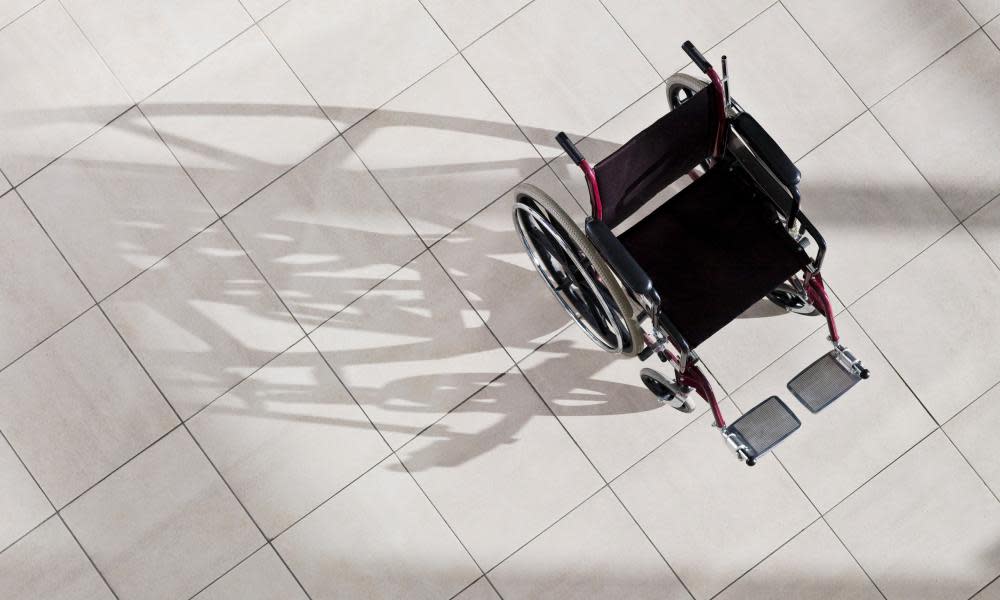The constant abuse and harassment from non-disabled people isn’t changing – in fact it’s getting even worse

This week’s disability royal commission hearing is another reminder that non-disabled people don’t see us as equal. The constant abuse and harassment from non-disabled people is exhausting, dangerous and leads to disabled people withdrawing from public and mainstream spaces. It’s a feeling I know very well.
I’ve had a stigmatised, disfiguring disability for over three decades, and this abuse and harassment is very familiar. I often say that “people have a strong reaction to how I look”, relying on euphemisms for the disgust they obviously display. When cash was still mostly used, people would flinch when I handed over money, insisting I drop it on a counter. People stare so much, on the train, on the street, in a cafe, everywhere.
People think it is totally OK to comment on the way I look, to insist that I answer their intrusive questions about my disability. People tell me that I shouldn’t be in public, that the way I look makes them uncomfortable. Well, actually, they aren’t that polite. “Fuck off freak”, “Get away from me so I don’t catch whatever that is”, “Oh God, I would kill myself if I looked that that” – that is actually what they say.
People tell me to leave swimming pools, gyms, shops, public transport. I have been sacked from jobs because “you make the public uncomfortable”. I’ve had complaints from work colleagues about my disability in the office.
Related: Woman of short stature tells inquiry how men yelling abuse triggered ‘trauma reaction’
When I was younger, I didn’t hide away, and would shout back at this public repudiation of my body. But I am tired now, and don’t have as much energy to continue to fight. I don’t work in public any more, or in an office. I rarely swim in a public pool. I limit my public activity and have to brace myself for the comments that come when I do go out.
This daily torrent of abuse and harassment from people that so many of us experience isn’t changing, and as the commission heard this week, is even getting worse.
The commission has heard about the violence and abuse so many of us experience at home, when homeless, in health care, in prison, in disability services, at school, at work and now in public. This public hearing has been looking at the abuse and violence that people do to disabled people when they are just being out in the world. Disabled people have spoken of being yelled at, assaulted, picked up, sexually harassed, sworn at, hit and robbed by people in the park, the shopping centre, on public transport and in their communities.
Dr Debra Keenahan, a woman of short stature, described the feeling of menace she feels, knowing what is likely to happen when people start the intrusive questions and the threatening actions. Fiona Strahan and Maree Jenner echoed this, telling the royal commission how they were always on alert because they have experienced so much abuse and harassment from people. People of short stature fought for this hearing because of how much abuse they get from strangers in public.
People with an intellectual disability are called disability slurs by people in public – the r-word and more. Their advocate told the commission that this stops them working for decent wages in the same kinds of jobs that other people get to do.
Keenahan said that people abuse and harass us because they don’t see us as their “moral equal”: people need to not just see more disabled people, but to see us as their equal, at work, at school, in the community.
That gets to the heart of what the disability royal commission is about. People abuse, neglect, exploit and harass disabled people because we aren’t seen as your equal, or even fully human.
We aren’t your equal at work. We aren’t your equal at school. We aren’t your equal in the community. In every single part of our lives, we aren’t equal and you exclude us from your world.
Covid has added another layer to this exclusion, with disabled people used to justify harsh public health measures while no measures to protect us were put in place. Disabled people now stay at home, stay out of the community: again, not equal, not included.
This withdrawal from public is our individual response to this violence and abuse and neglect, but it also means we are less visible to the very community that is uncomfortable about our existence.
Ending the violence against disabled people will come when we are really equal, and really included. When we sit alongside you on the train, at your staff meetings, in your school and at the footy. When you stop abusing and harassing us for daring to exist.
• El Gibbs is a disabled person, and an award-winning writer with a focus on disability and social issues. Gibbs’s work has appeared in Meanjin, Overland, the Guardian, the ABC and Eureka Street and can be found at elgibbs.com.au

 Yahoo News
Yahoo News 
